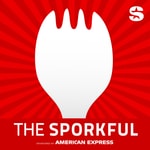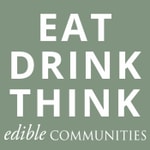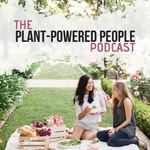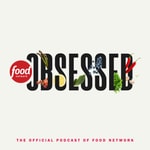AnthroDish – Details, episodes & analysis
Podcast details
Technical and general information from the podcast's RSS feed.
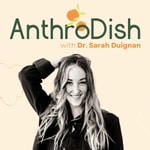
AnthroDish
Sarah Duignan
Frequency: 1 episode/16d. Total Eps: 160

Recent rankings
Latest chart positions across Apple Podcasts and Spotify rankings.
Apple Podcasts
🇬🇧 Great Britain - food
22/07/2025#100🇨🇦 Canada - food
08/06/2025#96🇨🇦 Canada - food
07/06/2025#77🇨🇦 Canada - food
06/06/2025#54🇨🇦 Canada - food
05/06/2025#28🇨🇦 Canada - food
04/06/2025#76🇨🇦 Canada - food
03/06/2025#41🇨🇦 Canada - food
07/05/2025#100🇨🇦 Canada - food
06/05/2025#75🇨🇦 Canada - food
05/05/2025#51
Spotify
No recent rankings available
Shared links between episodes and podcasts
Links found in episode descriptions and other podcasts that share them.
See all- https://www.instagram.com/p
11467 shares
- https://www.instagram.com/speakupforblue
1410 shares
- https://purelyelizabeth.com/
198 shares
- https://planthropologypodcast.com/
151 shares
- https://www.nationaleatingdisorders.org/
116 shares
RSS feed quality and score
Technical evaluation of the podcast's RSS feed quality and structure.
See allScore global : 53%
Publication history
Monthly episode publishing history over the past years.
130: Invisible Labour Behind Chicken Nuggets: The Immigrants Taking on America's Largest Meatpacking Industry with Alice Driver
Season 9 · Episode 1
mardi 3 septembre 2024 • Duration 30:20
We’ve heard stories about how chicken nuggets are riddled with questionable ingredients, but what gets missed when looking at industrial meat production is those who process a nation’s worth of meat and poultry, the immigrants working at Tyson meatpacking companies throughout Arkansas.
My guest today is Alice Driver, who has written a haunting exposé on the toxic labour practices experienced at Tyson, the largest meatpacking company in America. Alice is a J. Anthony Lukas and James Beard Award-winning writer from the Ozark Mountains in Arkansas. She is here today to discuss some of the central themes in her new book, Life and Death of the American Worker: The Immigrants Taking on America’s Largest Meatpacking Industry, which is out officially as of today through Simon and Schuster. She is also the author of More or Less Dead, and the translator of Abecedario de Juárez.
In our conversation, Alice details the story of the immigrant workers who had the courage to fight back after decades of deadly chemical accidents, hyper-surveillance, and unsafe working conditions throughout the COVID-19 pandemic. She unveils how the landscape and politics of Arkansas are marked by the poultry industry, and the exploitation models that went into creating such difficult and hazardous working conditions for those who are often subjected to invisible labour. She recounts how workers fought back in a lawsuit against Tyson Foods despite the potential consequences, and what is needed to truly change meatpacking industry standards.
Learn More From Alice:
- Book: Life and Death of the American Worker
- Website: https://www.alicedriver.com/
- Instagram: @alice_driver
129: Third Culture Cooking, TikTok Foods, and Kung Food Cookbook with Jon Kung
mardi 28 mai 2024 • Duration 34:49
For our last episode this season, we’re exploring what it means to cook from a third culture kitchen. There’s been growing discussions online of what it means to be a third culture kid or a third culture individual. My guest today, Jon Kung, is one of the best people to speak to how third culture experiences can play out through food, cooking, and kitchen spaces.
Jon is a popular Chinese American chef, content creator, and podcast host of 1 For the Table with legendary drag queen Kim Chi. Jon has amassed a following of over 2 million people for their unique style of third culture cooking, which blends cultural traditions, flavours, and ingredients that hold personal meaning to them. After graduating from Eastern Michigan University with a bachelor’s degree in theatre arts and creative writing, and then earning a law degree from University of Detroit Mercy, Jon changed career paths to focus on cooking. They worked in some of the top Detroit kitchens before launching their successful Kung Food Market Studio pop-up. As the pandemic forced the pop-up to shut down, Jon turned to social media to create instructional and entertaining cooking videos that explore the vast Chinese diaspora, and apply culinary techniques of traditional Chinese cooking onto global flavours and ingredients.
Jon is on the show today to discuss their debut cookbook, Kung Food: Chinese American Recipes from a Third Culture Kitchen. We explore what it means to cook through third culture lenses, the 2010s rebrand of American fusion cooking and its impact on the idea of authenticity and third culture expressions in food, TikTok food landscapes, how Jon translated their dishes and videos into a cookbook format, and Toronto’s early 2000s obsession pizza obsession.
Learn More About Jon:
- Jon's Cookbook: Kung Food: Chinese American Recipes from a Third Culture Kitchen
- TikTok: @jonkung
- Instagram: @jonkung
- YouTube: @jonkung
- Threads: @jonkung
- Website: https://www.kungfood.kitchen/
120: Making Sense of Misunderstood Vegetables through Humour and Celebration with Becky Selengut
mardi 20 février 2024 • Duration 40:01
Often when we make our grocery runs, time and money are on our mind – which can quickly lead to following a stringent list of household classics and crowd pleasers. But sometimes, in the corner of your eye, you might catch a new to you vegetable and wonder what the heck it is, or how it works. My guest today, Becky Selengut, is here to provide knowledge and humour in getting to know these misunderstood vegetables more.
Becky is a chef, author, instructor, and podcaster based in Seattle, and her latest cookbook is Misunderstood Vegetables: How to Fall in Love with Sunchokes, Rutabaga, Eggplant, and More out everywhere today. Her earlier books include How to Taste, Shroom, Good Fish, and Not One Shrine. When she’s not the chef aboard the M/V Thea Foss, Becky is also the cohost of the local foods podcast Field to Fork, forages for wild foods, makes a mean Manhattan, and shares her life with her sommelier wife April Pogue and their loony pointer mix Izzy and vocally gifted cat Jinx.
Becky is on the show today to explore the story behind her new cookbook, discussing what makes a vegetable misunderstood, how she works with learners and readers to make food and cooking more approachable and fun, the ways that foraging and misunderstood vegetables can connect us back to land and nature, and why it’s important to think about seasonality when writing a cookbook. While Becky’s humorous and playful approach makes these elusive vegetables less daunting, she also shares some underlying messages about how food and our own understandings of belonging are intertwined too.
Learn More About Becky:
- Buy Misunderstood Vegetables (or ask your local bookstore to bring it in!)
- Becky’s Website
- Podcast: Field to Fork
- IG: @beckyselengut
- Threads: @beckyselengut
38: LGBQ+ Health and Food Security with James Gibb
Episode 38
lundi 18 mars 2019 • Duration 39:31
Food security is a topic that’s very close to my heart, in part because of how complex and varied experiences of food access, affordability, and availability can be. This week, we’re breaking down food security amongst LGBTQ+ communities with James Gibb. James is currently a human biology graduate student at the University of Toronto, whose research focuses on the biocultural forces affecting health and wellbeing for sexual and gender minorities (SGMs).
In this interview, we explore the ways in which food and diet impact health outcomes for sexual and gender minorities. Nutrition is an important factor that influences individual risk for a number of non-communicable diseases, specifically in preventing morbidity and premature mortality. Despite food insecurity being linked to a number of physical and mental health outcomes, James has found that there is little research hon the nature of nutritional health for SGMs. We explore some of the reasons that these gaps in research and health programming exist, and James makes some suggestions about how we can start to connect nutrition, health, and the social processes of stigma, isolation, and discrimination for SGM communities.
37: William Lucas on Indigenous Food Transitions and Health in Rural Guatemala
Episode 37
lundi 11 mars 2019 • Duration 39:49
What really happens when a community undergoes a dietary transition, or shift? When speaking about Indigenous communities and their health, we often think of nutritional transitions as linear, and uncomplicated. But is this really a fair assessment of reality?
This week I’m speaking with William Lucas, a medical anthropology PhD student at the University of South Florida. His research has explored issues of Latino community health topics such as food and nutrition, diabetes, HIV, and Hepatitis C. His current doctoral work integrates these through syndemics research, where he analyzes the interactions between nutrition, disease, and other social and cultural factors in Guatemala, a country which experiences some of the highest rates of childhood stunting worldwide. Originally from Los Angeles, California, William developed his anthropological interests through his exposure to food deserts and swamps, issues of community violence, and other social determinants of health, as well as an interest in how overall health is implicated in all these areas of research.
In our interview, we explore his work with a remote Q’eqchi’ Maya community in Guatemala. We explore nutritional transitions and the internal and external mechanisms that influence community attitudes about what constitutes healthy or unhealthy food, and how Western-style processed foods are perceived. William’s work is very unique in that there are some interesting attitudes around the idea of what healthy food looks like, and how this plays out for other health conditions for the Q’eqchi’.
Resources
36: FEAST - Exploring Canadian Identities through Food with Lindsay Anderson and Dana VanVeller
Episode 36
mardi 5 mars 2019 • Duration 35:51
A topic that I feel we haven’t REALLY explored the way I’d like to is Canada’s food identity. And that’s something that my guests this week, Lindsay Anderson and Dana VanVeller know an awful lot about!
Lindsay and Dana are authors and freelance food writers based in Vancouver, British Columbia. Their award-winning culinary travel blog, edibleroadtrip.com launched in 2013 and went on to win a Saveur Best Food Blog Award. In 2017, they published their debut cookbook, Feast: Recipes and Stories from a Canadian Road Trip through Appetite by Random House. It quickly became a bestseller, and was awarded the Taste Canada Gold Award for Regional and Cultural Cookbooks. Their latest project saw them travelling to Nunavut as consultants on a country food cookbook with the Department of Fisheries and Sealing.
In our interview, they speak to what makes the foods and cuisines in Canada just so diverse and complex, and they highlight some of their experiences during their road trip and cookbook writing process. They even explore their more recent project working in Nunavut a bit and share the ways in which their connections with food have grown through time.
These women are such talented storytellers and they made me really think about what Canadian cuisines are and how that shapes our identities.
Resources:
Website: www.edibleroadtrip.com
Instagram: @feast_on
35: Mental Health and Wellbeing in the Food Industry with Hassel Aviles
mardi 26 février 2019 • Duration 39:39
As someone who’s worked in the food industry and has a partner and many friends that still work in the industry, the topic of mental wellbeing in these intense environments is of great importance to me and a topic I’m always keen to explore on the show.
My guest this week is someone who has done a terrific job creating a space in these environments for conversations around mental health and addictions. I’m speaking Hassel Aviles, a Toronto native with over 20 years of culinary experience in the food and beverage industry, specifically focused on restaurants, events, and entrepreneurship.
Hassel founded the Toronto Underground Market (or TUM) in 2011, which is a community festival turned incubator designed for food entrepreneurs, chefs, and home cooks. TUM was attended by thousands each month, and produced enormous tourism for Toronto, birthing over three dozen food brands in the GTA (including restaurants, celebrity chefs, food trucks, and catering companies). She leveraged TUM to launch and co-found the successful and delicious La Carnita, which is now a global restaurant franchises.
In addition, Hassel is the co-founder of Not 9 to 5 with Chef Ariel Coplan. Not 9 to 5 is a Canadian non-profit focused on normalizing the mental health and addiction conversations while providing connections to resources for those working in the food and beverage industry. In our interview, we explore her experiences creating and growing Not 9 to 5, and discuss the reasons that this particular food industry culture is such an important place to tackle conversations around mental health and addictions. Here is my interview with Hassel.
Not 9 to 5
34: Exploring Food and Stress at the Fortress of Louisbourg National Historic Site with David Ebert & Dr. Amy Scott
mardi 19 février 2019 • Duration 01:01:54
This week’s episode is extra special, as we have TWO phenomenal guests on: Dr. David Ebert and Dr. Amy Scott are here to talk about life and food at the Fortress of Louisbourg National Historic Site in Cape Breton, Nova Scotia! This episode runs a bit longer than most, because I wanted to weave together multiple ways of looking at and celebrating the past, and the role that the past plays for contemporary Canadians. Louisbourg is truly one of the most magical places I’ve been to, and Amy and David play a huge role in why I love the Fortress so much.
In the first part of the episode, I speak with David Ebert, who is part of the management team for Parks Canada’s Cape Breton team and the Fortress of Louisbourg. We explore the history of the Fortress, and he discusses what makes it such a fascinating part of Canadian and French history. David paints a vivid picture of what food and life were life for residents of the fortress during the 1700s, and the ways food is used now to make modern visits to the Fortress sensorial and interactive (aka super fun!)
During the second part, I speak with Dr. Amy Scott, an anthropology professor from the University of New Brunswick, and the project director of the bioarchaelogy field school at the Fortress. Dr. Scott has teamed up with Parks Canada for a long-term rescue archaeology project designed to document and protect the burial grounds out at Rochefort Point, where the shoreline has retreated about 90m in the past 300 years. I speak with Amy about the bioarchaeology side of things – we look at how we can learn about individual lives, stresses, health, mobility and diet just from their skeletal remains and burial context!
Parks Canada creates such an immersive experience and Amy’s UNB team does a fabulous job connecting with the public and engaging in dialogues about climate change in Canada and how it impacts not only our present but our past. It was such an honour to speak with these two about their work because they’re both so passionate and engaging!
Resources
Fortress of Louisbourg Association: http://www.fortressoflouisbourg.ca/
Parks Canada Website: https://www.pc.gc.ca/en/lhn-nhs/ns/louisbourg
UNB Bioarch Website: http://unb.ca/bioarchaeology
Field School on Facebook: https://www.facebook.com/unbbioarchaeologyfieldschool/
Field School on Instagram: https://www.instagram.com/unbbioarchaeologyfieldschool/
33: Sugar & Tension - Exploring Type 2 Diabetes and Gendered Health in New Delhi with Dr. Jo Weaver
lundi 11 février 2019 • Duration 45:14
What happens when someone gets diagnosed with type 2 diabetes? What happens after to that person's connections with their culture, identity, and family?
This week we’re exploring the connections between type 2 diabetes and gender for women living in New Delhi with Dr. Jo Weaver. Dr. Weaver is an assistant professor in the department of International Studies at the University of Oregon. She is a biocultural medical anthropologist, who’s research addresses chronic diseases, mental health, and food insecurity in India and Brazil. She also co-hosts the podcast Speaking of Race (another fantastic show sponsored by the AAAs).
In our interview, Dr. Weaver highlights some of her key findings from her research with women managing type 2 diabetes in India. She explores the strong connections between cultural identity, gender roles, mental wellbeing and dietary shifts that these women experience after their diagnoses, and the connections between the lived experiences of these women and some of the biochemical markers for stress that she found during her studies. Dr. Weaver very poignantly sums up the complexity of diabetes as a social disease in this interview, and I’m excited for you to learn as much from her as I did.
Resources:
Dr. Weaver’s Book, Sugar and Tension: Diabetes and Gender in Modern India
32: Escape to Reality - Food, Growing, and Starting a Business with Ben Cullen
mardi 5 février 2019 • Duration 45:15
I’ve known this week’s guest, Ben Cullen, for a number of years, and am always excited to talk food with him at any gathering we’re at. So naturally he’s been someone I’ve wanted to bring on the show for quite a while! Ben is the owner of the recently launched Cullen’s Foods, and a fourth-generation urban gardener. As the son of expert gardener Mark Cullen, Ben has worked with his father his whole life, but officially joined Mark full-time in January 2017. Together they write a weekly column for the Toronto Star on horticulture, and have a new book out, Escape to Reality: How the World is Changing Gardening, and How Gardening is Changing the World.
On the show, Ben discusses what makes gardening such an important tool to actively reimagine more sustainable, healthy, and happier futures. Ben has a unique perspective on the food world, as he spent some time working in the food industry following his agricultural education. We explore the nuances of these dual identities and the implications they have for his business, along with how he uses this knowledge to increase accountability and sustainability of food business in local spheres.
I love talking with Ben because we come to the idea of food sustainability from two different lenses. I think this is important, given the echo chambers of social media: it’s easy to get caught up in ideas and spheres that make us comfortable… and the ideas in commerce and business certainly don’t come naturally to a biocultural anthropologist like me! When we’re thinking about anti-consumerist futures, it’s important to look at how different backgrounds and experiences can help shape these futures together.
Enjoy the episode in the web player above, or download on iTunes, Spotify, Stitcher, Google Play, or iHeartRadio.
Resources:
- Ben and Mark Cullen’s Escape to Reality: How the World is Changing Gardening and How Gardening is Changing the World
- Ben and Mark’s Toronto Star Column
Get Social with Ben!


